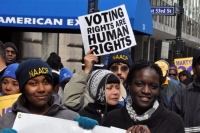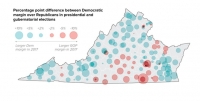
- Home
- About
- Campaigns
- PDA Radio
- Contact Us
- Downloads
- Join Us
- Donate
- Events
- Benefit Kitchen

End Racism and Discrimination (72)
Baltimore, Detroit threaten thousands with water shut-off
Written by Daniel Dale | Toronto StarA drought has forced Californians to ask themselves how much water their lawns and gardens truly need.
A money shortage has Baltimore and Detroit pondering a different water question: whether the poor are entitled to any at all.
Residents protest city's planned water shut-offs
Written by Yvonne Wenger | Baltimore SunA couple of dozen protesters rallied outside City Hall on Monday to call on officials to reverse a decision to begin turning off service for water customers who are behind on their bills. Sharon Black, a Waverly woman who helped organize the protest, called on the city to delay any water shut-offs. The protesters want the City Council to investigate the reasons why the delinquent water customers are late in paying.
Baltimore activists fight back – Water is a human right!
Written by David Card | Workers WorldAt the end of March, Baltimore city officials announced that they would be turning off the water supply to a huge number of properties in the city and surrounding county in the coming weeks. In total, the city department of public works plans to turn off water to 25,000 properties for $40 million in unpaid bills.
This City Could Become The Next Detroit
Written by Carl Gibson | ThinkProgressStarting this week, 25,000 households in Baltimore will suddenly lose their access to water for owing bills of $250 or more, with very little notice given and no public hearings.
Detroit Water Brigade Part of Larger Struggle
Written by Demeeko Williams | Detroit NewsDeep Questions Arise Over Portland's Corporate Water Takeover
Written by Victoria Collier, Truthout | News AnalysisA simmering water war is about to come to a boil over the fate of historic, well-loved public reservoirs in Portland, Oregon. At the heart of the controversy is a breakdown in public trust that reflects the dangers of corporate-led water privatization schemes in the United States and around the world.
Rev. Edward Pinkney Imprisoned for Fighting the Whirlpool Corporation
Written by Victoria Collier and Ben-Zion Ptashnik, Truthout | News Analysis"Here, Whirlpool controls not only Benton Harbor and the residents, but also the court system itself. They will do anything to crush you if you stand up to them. That's why it's so important to fight this. I'm going to fight them until the end. This is not just an attack on Rev. Pinkney. It's an attack on every single person that lives in Benton Harbor, in the state and around the country." - Rev. Edward Pinkney
Convicted With No Evidence by an All-White Jury, Black Community Leader Faces Life in Prison
Written by Victoria Collier and Ben-Zion Ptashnik, Truthout | News AnalysisThe fight in Benton Harbor is a war, it’s not a conflict. It’s a war over whether America will have prosperity and democracy, or live in poverty under the heel of open corporate rule. - Rev. Edward Pinkney
Rev. Pinkney Convicted, Threatened with Life in Prison
Written by Glenn Ford | Black Agenda ReportRev. Edward Pinkney, the 66-year-old community activist who has battled for decades on behalf of the mostly Black population of Benton Harbor, Michigan, was this week convicted on five counts of forging the dates of some signatures on a petition to recall the town’s mayor. The Berrien County jury was all-white. So was the judge and the prosecutor.
A Tale of Two Detroits, Separate and Unequal
Written by Laura Gottesdiener | In These TimesIn the new Detroit, a small number of wealthy residents are protected by private security and constant surveillance while the city’s black majority struggles to maintain access to water.
More...
'A Crime': Groups Say Detroit Bankruptcy Plan Benefits Rich, Attacks Working People
Written by Andrea Germanos | Common DreamsPay Rent or Drink Water: The Human Rights Crisis in Detroit Escalates
Written by Ben Ptashnik, Truthout | News Analysis | TruthoutDespite mass protests, the emergency management water shutoffs in Detroit have resumed, even as UN experts publish a press release calling the water disconnects "contrary to human rights" and activists decry them as "genocide."
Detroiters Vow Resistance After Judge Rules There is No Human Right to Water
Written by Lauren McCauley | Common DreamsThe people of Detroit are vowing resistance after a federal bankruptcy judge on Monday ruled that the city can continue shutting off water to its poorest residents if their bills cannot be paid.
Judge Says Poor Have No Right To Clean Water, Allows Detroit Water Shutoffs To Continue
Written by Alan Pyke | ThinkProgressSaying there is no such thing as a legal right to clean running water, U.S. Bankruptcy Judge Steven Rhodes dismissed a request from Detroit residents to impose a six-month moratorium on water shutoffs by the Detroit Water and Sewerage Department (DWSD) on Monday.
Latest News
-
Trump administration's voter suppression attempts ahead of midterms are not only 'morally wrong,' they're illegal +
 Imagine going to the polls on Election Day and discovering that your ballot could be collected and reviewed by the… Read More
Imagine going to the polls on Election Day and discovering that your ballot could be collected and reviewed by the… Read More
-
ACLU Blueprints Offer Vision to Cut US Incarceration Rate in Half by Prioritizing 'People Over Prisons' +
 ACLU Blueprints Offer Vision to Cut US Incarceration Rate in Half by Prioritizing 'People Over Prisons' Read More
ACLU Blueprints Offer Vision to Cut US Incarceration Rate in Half by Prioritizing 'People Over Prisons' Read More
-
As Florence Makes Landfall, Poorest Once More Likely to Suffer Most From Storm's Destruction +
 "These disasters drag into the light exactly who is already being thrown away," notes Naomi Klein Read More
"These disasters drag into the light exactly who is already being thrown away," notes Naomi Klein Read More
-
How about some good news? Kansas Democratic Representative advances bill for Native Peoples. +
 How about some good news? Kansas Democratic Representative advances bill for Native Peoples. Read More
How about some good news? Kansas Democratic Representative advances bill for Native Peoples. Read More
-
How One Dying Man Changed The Debate About The Tax Bill +
 What mattered was that he showed up — that he put himself in front of the people whose opinions on… Read More
What mattered was that he showed up — that he put himself in front of the people whose opinions on… Read More
-
Democrats Just Won a Major Victory in Virginia +
 On a night of Democratic victories, one of the most significant wins came in Virginia, where the party held onto… Read More
On a night of Democratic victories, one of the most significant wins came in Virginia, where the party held onto… Read More
-
Repealing the Jim Crow law that keeps 1.5 million Floridians from voting. +
 A seismic political battle that could send shockwaves all the way to the White House was launched last week in… Read More
A seismic political battle that could send shockwaves all the way to the White House was launched last week in… Read More
-
Nuclear Weapons: Who Pays, Who Profits? +
 In an interview with Reuters conducted a month after he took office, Donald Trump asserted that the U.S. had “fallen… Read More
In an interview with Reuters conducted a month after he took office, Donald Trump asserted that the U.S. had “fallen… Read More
-
Sessions issues sweeping new criminal charging policy +
 Attorney General Jeff Sessions overturned the sweeping criminal charging policy of former attorney general Eric H. Holder Jr. and directed… Read More
Attorney General Jeff Sessions overturned the sweeping criminal charging policy of former attorney general Eric H. Holder Jr. and directed… Read More
- 1
- 2













